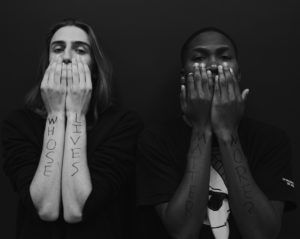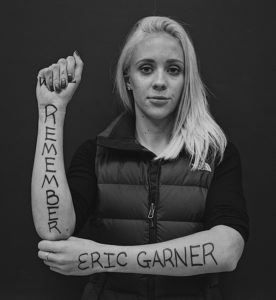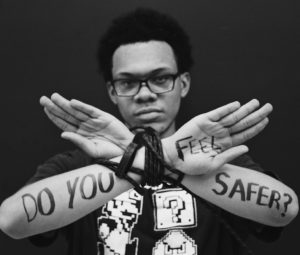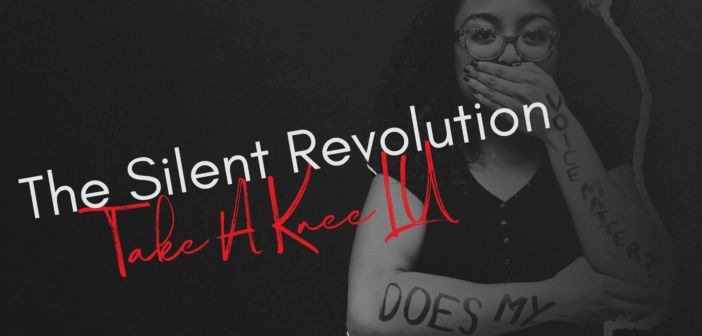The annual Lehigh-Lafayette football game inspires school spirit, camaraderie and this year for a number of students, revolution.
At 12:28 p.m. on Nov. 18, hours before Lehigh’s win against Lafayette at the 153rd Rivalry game, an estimated 25 Lehigh students gathered in the stands of Goodman Stadium. At the start of the national anthem, they took a knee.
For roughly two minutes, while nearly 15,270 attendees stood as the national anthem rang through the stadium, these students knelt silently and peacefully in protest of issues surrounding the treatment of people of color in the United States.
The protesters drew inspiration from the bent-knee stance that football player and activist Colin Kaepernick first assumed nearly 17 months ago. They were influenced by the same push for racial equality that motivated Kaepernick’s now iconic action.
But for them, taking a knee at the game represented more than allegiance to the fight against racial issues existing in the nation. It was a call for attention to the racial issues within this institution — issues that members of the protest believe most Lehigh students are disconnected from.
Take A Knee LU protest organizer Eliza Wastcoat, ’20, said this disconnect is rooted in a lack of experience and education when it comes to discussing race and racial awareness.
“A majority of our students have very little experience interacting with minority groups,” Wastcoat said.
The protesters believe this behavior and its implications are felt by minority students on campus.
On Oct. 22, students hung posters promoting the protest around campus. The next day, Usman Ologunebi, ’20, a protest organizer who was featured in one of the posters, was called ‘blackface’ by a student passing by. Some posters were ripped down or partially torn and the words “All Lives Matter” were written over the “Black Lives Matter” printed on the flyers.
Several protest supporters said there is a heavy “email culture” and lack of transparency adopted by organizations and the administration following racial incidents.
On Oct. 26, the Interfraternity Councill sent an email in response to an incident involving racial slurs made at a Psi Upsilon party in late September. Newly-elected IFC president, Ian Davis, ’18, said the council was hesitant to respond because it was unsure what the environment looked like and at the time, the allegations were still under investigation.

Joey Repuero, ‘20 Usman Ologunebi pose for photo. The words, whose lives matter more, written on their arms. The photos were used in the flyers advertising the Take A Knee LU. Courtesy of Julius Wibisono.
The email that IFC later sent out stated, “The IFC will follow its own procedure to ensure that the responsible organization(s) and student(s) understand the consequences of their behavior and the resulting negative impact on Lehigh’s community.”
An investigation led by the Office of General Counsel found members of the fraternity were not directly involved in the incident. Following the investigation, Davis and the counsel proposed a soft sanction that required general members of the fraternity to research and think critically about the incident.
Psi Upsilon members recently presented their findings at an educational workshop held on Dec. 5. Davis said IFC hopes the newly-implemented soft sanction workshop will lead to a more inclusive, mindful and accountable future concerning bias-related incidents within organizations.
Kevelis Matthews-Alvarado, ’20, a protest organizer, said Lehigh’s student body is comprised of an enormous amount of economic privilege. Lehigh reports that 64 percent of its students are white and 67 percent come from the top 20 percent, in terms of income.
Matthews-Alvarado said with economic privilege often comes white privilege. She said an overwhelming majority of Lehigh students come from a specific, privileged background — a background that explains why they don’t care about racial issues.

Eliza Wastcoat, ‘20 poses for a photo with the words, “remember Eric Garner” written on her arms. The photos were used in the flyers advertising the Take A Knee LU. Courtesy of Julius Wibisono.
The repetitious cycle of protests followed by the rise of “email culture” has given way to the argument that Lehigh is a reactionary campus that only addresses racial issues after they occur rather than preventing them from occurring in the first place.
“Even if the messages behind these actions are genuine, and I believe they are, you have to think about the weight it holds,” Matthews-Alvarado said. “It’s not effective.”
Wastcoat said Lehigh still needs to make a lot of progress to create an accepting, inclusive environment. The movement is one step in getting there.
Wastcoat collaborated with Cultural Greek Council members, including Djenne Dickens, ’18, Dabney Brice, ’18, Julius Wibisono, ’20, and students Juwan Royal, ’18, Ruben Rosas, ’20, Joey Repuero, ’20, Matthews-Alvarado and Ologunebi, who all felt strongly about addressing racial issues on campus.
The group began planning the protest in early October. Wastcoat said the Lehigh-Lafayette football game emerged as the perfect venue for the protest because of its popularity among students, faculty, staff, alumni and donors.
Leading up to the protest, the group created a set of demands advocating for the implementation of mandatory classes in Africana studies, gender studies and racial discussion, as well as a stricter implementation of the code of conduct. The group has not yet sent its set of demands to the university.
Wastcoat said there has been much contention since the protest began.
Similar to the response to Kaepernick’s original action, the Lehigh protest has been criticized for anti-patriotic sentiment by some members of the university. Dickens, Royal and Matthews-Alvarado, whose fathers are all veterans, disagree with that opinion.
Royal said his father, who fought in the Middle East for nearly four years, risked his safety so Americans can have the freedom to speak their minds and live as they want to live, as long as they don’t harm others.
After the protest campaign posters were displayed, Wastcoat received a number of messages, some lauding the idea and others questioning her position in the protest as a white student.

Juwan Royal, ‘18 poses with his arms crossed and hands tied with the words Do you feel safe written on his arms. Courtesy of Julius Wibisono.
“I am aware I do not personally have experience facing these microaggressions, facing racism,” Wastcoat said. “I just know that it is wrong, and I want to help do something about it.”
Ironically, the reactions made in the wake of the protest echo the lack of racial empathy and awareness Take A Knee LU is focused on.
The protest did not receive the recognition or the notoriety expected by some of the participants. Some of the protest participants said they are skeptical as to whether or not their actions left an impression on the campus.
However, Dickens said their actions were valuable.
“As a group who took the knee, I feel like we valued what we were doing and we knew the purpose behind it,” Dikens said. “As a group, we were together.”
The heart of the LU movement is rooted in the need for change on campus and the determination to pursue change, as the alternative endangers the lives of people of color and divides the country.
“I’m tired of being passive,” Royal said. “More and more each day, (action) seems like a necessity. I can’t just keep watching this and not have any sort of input. I’m taking a knee because I feel like I can’t afford not to anymore.”






Comment policy
Comments posted to The Brown and White website are reviewed by a moderator before being approved. Incendiary speech or harassing language, including comments targeted at individuals, may be deemed unacceptable and not published. Spam and other soliciting will also be declined.
The Brown and White also reserves the right to not publish entirely anonymous comments.
2 Comments
Irritating people doesn’t usually help in getting people to agree with your ideas. Recently at mass I heard a homily about a black musician who was congratulated on his Jerry Lee Lewis style music. The musician noted that Lewis’ music was based on music developed by blacks. At a later time the man identified himself as a KKK member who eventually gave up his membership and sent his robe to the musician. The musician made an effort to change one person at a time.
There are to many people in this world who are looking for ways to irritate others. Try to appreciate others and get them to appreciate you. Many people agree with your ideas not your methods.
I swear, it’s like Lehigh alums never get farther than being the Clybourne Park Welcoming Committee.
It is not the protesters’ job to make you feel comfortable and good about yourself. They’re not here to sell you a blender. They’re here to announce to existence of a problem and a refusal to shut up and let you feel comfortable until the problem is dealt with. And Alabama got up the other night and gave some sign that the problem will be dealt with.